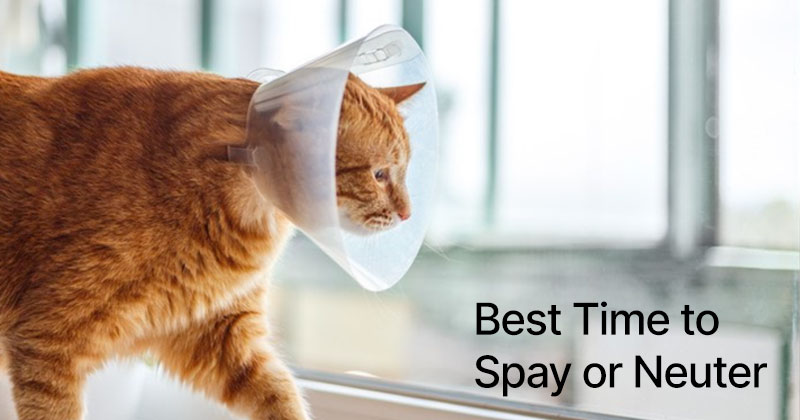
As a responsible pet owner, one of the most important decisions you'll make is when to spay or neuter your cat. This choice plays a key role in your cat's overall health and well-being while also helping to control the pet population. Whether you’re a new kitten parent or have recently adopted a cat, this guide will provide valuable insights. If you’re unsure about the timing, call Ridgeview Animal Hospital at (402) 333-3366 or request an appointment today.
Spaying, the removal of the ovaries and uterus in female cats, eliminates the risk of uterine infections and greatly reduces the likelihood of breast tumors. For male cats, neutering, which involves removing the testicles, prevents testicular cancer and lowers the chances of prostate issues later in life. Spaying or neutering your cat can also improve behavior. Male cats are less likely to roam or display aggressive behaviors. Female cats won’t go into heat, which can reduce undesirable behaviors like yowling and marking territory. By having your cat spayed or neutered at the right time, you’re helping them avoid these health and behavioral concerns.
After the procedure, you may notice that your cat becomes calmer, particularly males:
The behavior improvements often start within a few weeks of the surgery. Your cat will still retain their individual personality, but many of the hormonal behaviors linked to mating instincts will be reduced or disappear entirely.
Generally, veterinarians recommend having the procedure done before your cat reaches sexual maturity, which is around five to six months of age. This helps prevent unwanted behaviors and health issues before they develop. However, early-age spaying and neutering can be done as young as eight weeks old, especially in shelter environments where controlling the population is a priority. Discuss with your veterinarian the best timing for your cat, as individual circumstances may affect this decision.
Younger cats recover more quickly from surgery and tend to experience fewer complications. That said, adult cats can still be spayed or neutered if they missed the window as kittens. If you adopt an older cat that hasn’t been spayed or neutered, it’s never too late to make the responsible choice for their health. If you're uncertain about the best time to spay or neuter your cat, call Ridgeview Animal Hospital at (402) 333-3366 to discuss your options. Your veterinarian can help you determine the right time based on your cat’s health and lifestyle.
Spaying or neutering your cat at the optimal time can lead to a longer, healthier life. Cats that undergo these procedures at the right age are less likely to develop certain cancers or infections, reducing the need for future medical treatments. The health benefits of early spaying or neutering include the prevention of uterine infections and breast tumors in females and testicular cancer in males. Male cats are less likely to wander, decreasing their chances of getting into fights or being exposed to dangerous situations like traffic accidents. Both male and female cats will be less prone to marking their territory inside your home.
In addition to the personal health and behavioral benefits for your cat, spaying or neutering also benefits the community. Fewer unwanted litters reduce the number of stray cats and overpopulation in shelters. This helps ensure that more cats find loving homes and decreases the strain on local animal shelters. By choosing to spay or neuter your cat, you're making a positive impact on the community as well as protecting your pet’s health.
The recovery process after spaying or neutering is typically straightforward, but it’s important to follow your veterinarian’s instructions to ensure your cat heals properly. Most cats recover quickly, usually within a week or two, with minimal discomfort. During the first few days, monitor your cat closely and prevent them from licking the surgical site, which can cause infections. Your vet may recommend using an e-collar to prevent this behavior.
If your cat seems unusually lethargic or shows signs of pain, contact your veterinarian. While complications are rare, it’s always best to be safe. If you have any concerns about your cat’s recovery, don't hesitate to call Ridgeview Animal Hospital at (402) 333-3366 for advice.
Although spaying or neutering is often recommended for kittens or young cats, older cats can still benefit from the procedure. However, senior cats may need additional pre-surgical tests to ensure they are healthy enough for anesthesia and surgery. Your vet may recommend blood tests or other diagnostic tools to check for underlying health conditions that could affect the procedure. If you have a senior cat, talk with your veterinarian about the risks and benefits of spaying or neutering at an older age. Ridgeview Animal Hospital can help you weigh the pros and cons and determine the best course of action for your pet’s unique needs.
The decision to spay or neuter a cat is an important one that can lead to lasting benefits throughout your cat’s life:
If you're unsure about when to spay or neuter your cat, Ridgeview Animal Hospital is here to assist you. Give us a call at (402) 333-3366 or request an appointment today.
Choosing the best time to spay or neuter a cat is an important step in promoting their health and happiness. Discussing the timing with your veterinarian is necessary for making the best decision, regardless of your pet’s age. Spaying or neutering can reduce health risks, improve behavior, and contribute to controlling the cat population in Omaha and beyond. To learn more about when to spay or neuter your cat, contact Ridgeview Animal Hospital. We’re here to provide expert care and guidance, ensuring your cat enjoys a healthier and happier future.


